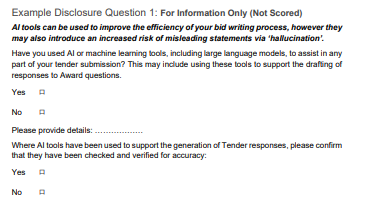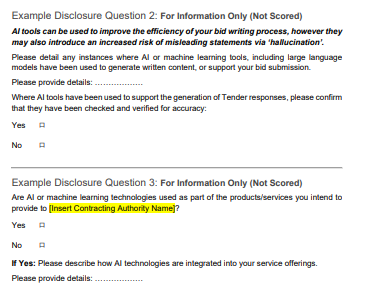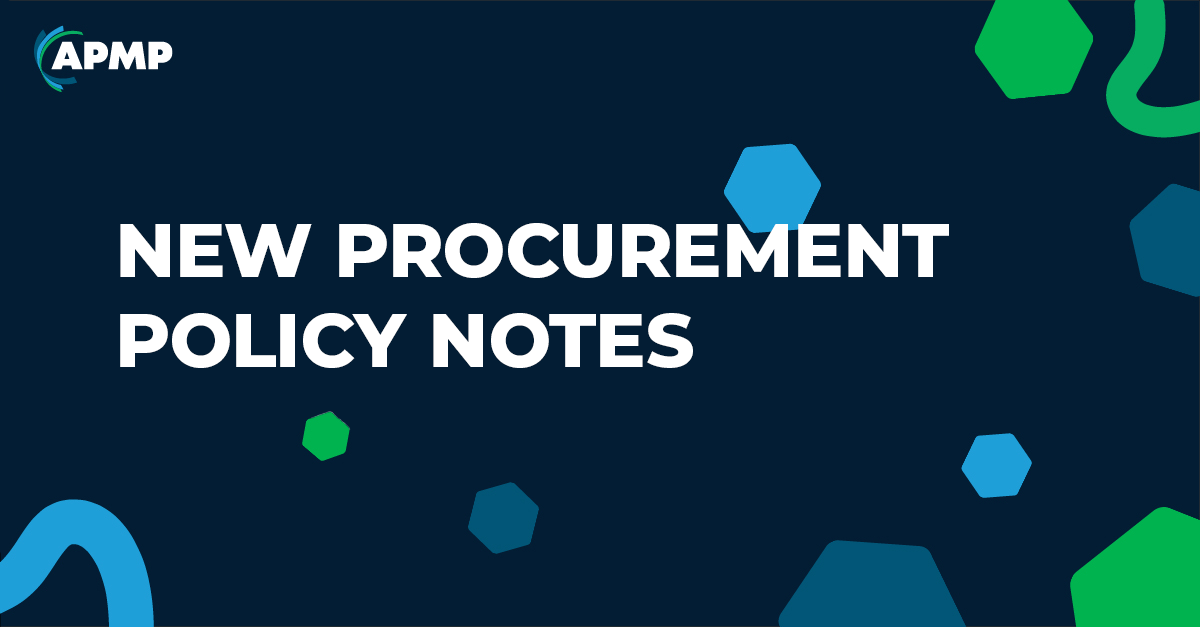UK Procurement Updates: Three New Procurement Policy Notes Published
The UK Cabinet Office has had a busy couple of weeks! Within the last ten days, three new procurement policy notes have been published:
- PPN 01/24 – Carbon Reduction Contract Schedule
- PPN 02/24 – Improving Transparency of AI use in Procurement
- PPN 03/24 – Standard Selection Questionnaire (SQ)
These documents come with varying levels of obligation. Adoption of the standard T&Cs and framework offered in PPN 01/24 is optional, and PPN 02/24 offers general guidance and recommendations rather than binding requirements. PPN 03/24, however, alters statutory guidance, meaning the amendments it makes reflect changes to policy and must be observed.
If you’re feeling a little overwhelmed by all these new documents dropping more or less at once, I’ve got you covered. I’ve broken down the key things you need to know from each policy note below!
PPN 01/24 – Carbon Reduction Contract Schedule
This policy note introduces the Carbon Reduction Contract Schedule. The Schedule gives contracting authorities a set of terms and conditions (T&Cs) to use in their procurement contracts to support decarbonisation objectives.
This policy note builds upon PPN 06/21, which encouraged contracting authorities to require a Carbon Reduction Plan from suppliers, and provided a template for use. It aligns with the Government Net Zero Target – a target of at least a 100% reduction in the net UK territorial carbon account by 2050.
The use of the T&Cs is optional, and the Cabinet Office clarifies that they should only be employed where it is relevant to the subject matter of the contract and is proportionate to do so. The optional Schedule includes provisions which would require suppliers to:
- Do their best to minimise environmental impact throughout contract delivery.
- Set their own ‘Net Zero Target’ if they don’t already have one.
- Set Emissions Reduction targets for contract delivery.
- Re-assess GHG Emissions every Contract Year and provide the contracting authority with a written report of the results of each assessment – the timeline for providing this report is at the buyer’s discretion.
- Notify the contracting authority as soon as they become aware of any reason why they may not meet their Net Zero contractual commitments and implement an improvement plan.
- Avoid fuel emissions wherever possible.
There are other optional paragraphs, including sector-specific clauses, which are available in the policy note’s supporting guidance here.
PPN 02/24 – Improving Transparency of AI use in Procurement
This policy note outlines the government’s guidance for suppliers and procurement teams regarding the use of AI throughout the tendering process.
The document outlines the importance of understanding potential risks associated with AI – namely possible increases in supplier activity, the use of confidential contracting authority information to train AI systems, and inaccurate or misleading information within bids.
Notably, the document directly acknowledges that there are benefits to bidders in the use of AI and makes clear that its use is not prohibited during the commercial process. However, it does advocate for additional planning and due diligence on the part of contracting authorities, and transparency on the part of bidders in the form of disclosures in tender responses.
It’s important to note that this document is not statutory, meaning it puts forward no legal obligations.
Additional planning and due diligence
Interestingly, the government states that, as suppliers begin to use AI to streamline their processes, contracting authorities should begin to prepare for an increase in supplier activity, including an increase in tender responses. It advises allowing more time in the procurement process to allow for higher volumes of responses and additional due diligence.
When it comes to additional due diligence, the document recommends supplier presentations, clarification questions, site visits and supporting documentation as methods which buyers can implement in order to ensure that suppliers’ capabilities and capacity match up with what is outlined within their tender responses.
This appears to be a recommendation to strengthen pre-existing due diligence processes which are already part of a contracting authority’s duties. The document recommends that additional due diligence is “proportionate to any additional specific risk posed by the use of AI”.
Disclosure of AI use in tender responses
We recently undertook a poll on our LinkedIn regarding AI disclosure questions in ITTs. Only 15% of the 275 respondents stated that buyers have inquired about AI usage during proposal development (with 81% stating that they haven’t and 4% being unsure or unable to recall).
But things may be set to change – in the UK at least – as this policy note offers recommendations for questions that buyers can ask to discern whether AI has been used throughout the proposal development process.
The below questions are those the Cabinet Office suggests:


While the urge for increased transparency around the use of AI is something that many in the industry will be pleased to see, there is some ambiguity in the disclosure questions, and it will be interesting to see whether this is clarified at a later date.
The suggested questions are labelled as ‘not scored’, but it isn’t yet clear how the answers to these questions will be taken into account by procurement teams if they are not intended to impact the outcome of the procurement. The document also doesn’t clarify any expectations for the consequences of disclosing inaccurately, e.g. claiming AI has not been used where it has.
Considering the fact that the use of AI is near impossible to detect with complete certainty – and potential fears among bid teams about being scored unfavourably due to an AI use disclosure – it will be interesting to see how these disclosure questions are implemented, and answered, in practice.
PPN 03/24 – Standard Selection Question (SQ)
This policy note updates the Selection Questionnaire (SQ) and the accompanying statutory guidance. Relevant contracting authorities (all those in England and certain ones in Wales and Northern Ireland) have three months to implement the changes.
The key updates to the SQ that you need to be aware of are as follows:
- Payment-questions have been updated.
- Steel-related questions have been updated.
- The guidance states that it is possible to decline to consider bids from Russian and Belarusian suppliers under certain circumstances.
- The format of the SQ has changed for compatibility with new e-procurement platforms.
- References to PAS91, the Construction pre-qualification questionnaires, have been removed due to its withdrawal by the British Standards Institution.
It’s probably a good idea to familiarise yourself as soon as possible with the new format of the SQ and the updates made to the questions! Even though the changes must be implemented within three months, buyers could start using the new SQ immediately if they wish.
What’s next?
All three documents can be found on the government’s Procurement Policy Notes page here. Fingers crossed we get a bit of a breather now before PPN 04/24!
Want to write for the Winning The Business blog?
As well as keeping APMP members up to date with the goings-on at APMP HQ, this blog is an opportunity for you to share your valuable insights and experiences with the rest of the APMP community. After all, you’re the experts!
If you have tips, experiences, practices or lessons learned that you’d like to write an article about, email me, APMP’s Writer/Editor, at erin.smith@apmp.org and I will guide you through the next steps. You can also check out our submission guidelines here. I’m looking forward to hearing from you.



Join the Conversation